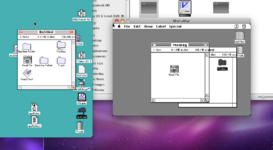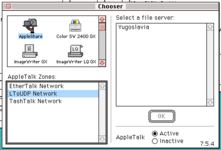Update: The offending patch has been
reverted, there's a
PoC reintroducing the old behavior under a "quirks mode" switch of some kind. Also, there's some interesting
discussion on the issue.
One of the points of discussion that interests me is the valid point about comparative availability/popularity of TashTalk/TashRouter, which is something I'd very much like to improve.
Paging
@mactjaap - what would it take to integrate TashRouter into your RPi distro? A one-stop "just burn this to an SD card" solution that gives you full-fledged AppleTalk routing, file and printer sharing, and MacIP is definitely something worth having.
@twelvetone12 is working on
USB2LT, which would be a big step as far as availability of TashTalk, and of course I still
sell TashTalk 2 RPi hat kits whenever I have the parts to put them together, but both are still some distance from being a finished product you can just buy off the shelf. Any interest,
@rabbitholecomputing?
In addition, while it's convenient to wrap everything up in an RPi, as
@demik pointed out, one doesn't actually need an RPi to run TashRouter - an AirTalk (which can be
had for €49 thanks to the efforts of
@daanvdl) to bridge LocalTalk to LToUDP, plus a VM to run TashRouter and connect LToUDP to EtherTalk, will do the job just as well.
Not sure how best to make these solutions accessible, but a PyPI package would probably not be the worst place to start... I've just been holding off because I feel like the code is still pretty green. Could maybe do native packages for popular distros and/or a Docker container, too...
Anyway, I'm just throwing dreams at the wall, to mix a metaphor. It's a tall order, I realize, but I
really want this to overtake the popularity of AsantéTalk, so everyone who wants one can have a fully standards-compliant LocalTalk/EtherTalk router and not have to shell out $100+ to get a used AsantéTalk (with all its weirdness and incompatibility) off eBay.


